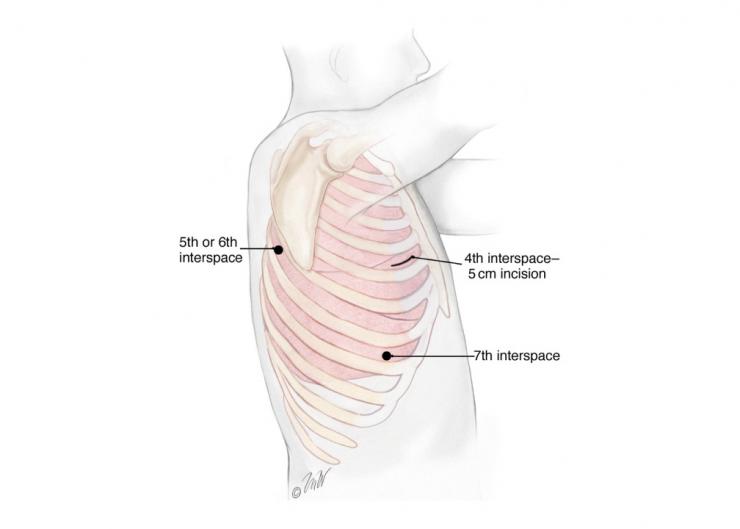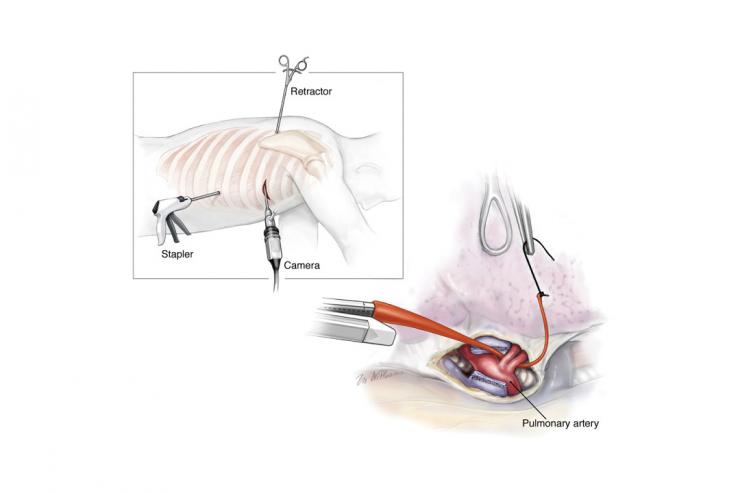Video-assisted thoracic surgery lobectomy is a pulmonary lobectomy procedure that is performed by a minimally invasive technique. A VATS lobectomy, or thoracoscopic lobectomy, procedure is performed using a video camera and working instruments that are inserted through three small incisions, with no spreading of ribs. Compared to a traditional open approach to lobectomy, which is performed through a thoracotomy incision, VATS lobectomy is associated with significantly less pain, shorter hospital stays, and decreased surgical complications and without compromising cancer-related outcomes.
Why the Procedure Is Performed
VATS lobectomy is indicated for the treatment of:
- Non-small cell lung cancer
- Metastasectomy for tumors that cannot be removed by lesser (sublobar) resections
- Carcinoid tumors that cannot be removed by lesser (sublobar) resections
Before Surgery
Before surgery, our team will perform tests that may include a chest CT scan, a PET-CT and pulmonary function studies.
Day of Surgery
The procedure is performed with general anesthesia using a special endotracheal tube that allows intentional collapse of the lung which is operated on.
The procedure is performed through a series of small incisions.
The camera incision is created first, and the thoracoscope (camera) is inserted for inspection of the chest.
Two additional small incisions are made and the lobectomy is procedure commences by division of the main vessels and airways that supply the lobe that will be removed. The dissected lobe is typical placed in a bag and removed via one of the incisions. A complete lymph node dissection is additionally performed thoracoscopically.
Outlook
Compared to a traditional open approach to lobectomy, which is performed through a thoracotomy incision, VATS lobectomy is associated with significantly less pain, shorter hospital stays, and decreased surgical complications. A complete lymph node dissection is performed thoracoscopically, just as it would be done in an open procedure, resulting staging that is comparable to an open procedure. Importantly, the completeness of resection and cancer-specific outcomes are similar between VATS lobectomy and open lobectomy.
References
Sugarbaker DJ, Bueno R, Krasna MJ, Mentzer SJ, Zellos L (eds). Adult Chest Surgery. New York: The McGraw-Hill Company, 2009.
Garcia J, Richards W, Sugarbaker D. Surgical treatment of malignant mesothelioma. In Kaiser LR, Kron IL, Spray IL (eds). Mastery of Cardiothoracic Surgery. Philadelphia: Lippincott-Raven, 1997.
Burt BM, Kosinski AS, Shrager JB, Onaitis MW, Weigel T. Thoracoscopic lobectomy is associated with acceptable morbidity and mortality in patients with predicted postoperative forced expiratory volume in 1 second or diffusing capacity for carbon monoxide less than 40% of normal. J Thorac Cardiovasc Surg. 2014 Jul;148(1):19-28.
Paul S, Isaacs AJ, Treasure T, Altorki NK, Sedrakyan A. Long term survival with thoracoscopic versus open lobectomy: propensity matched comparative analysis using SEER-Medicare database. BMJ. 2014 Oct 2;349:g5575.








 Credit
Credit

